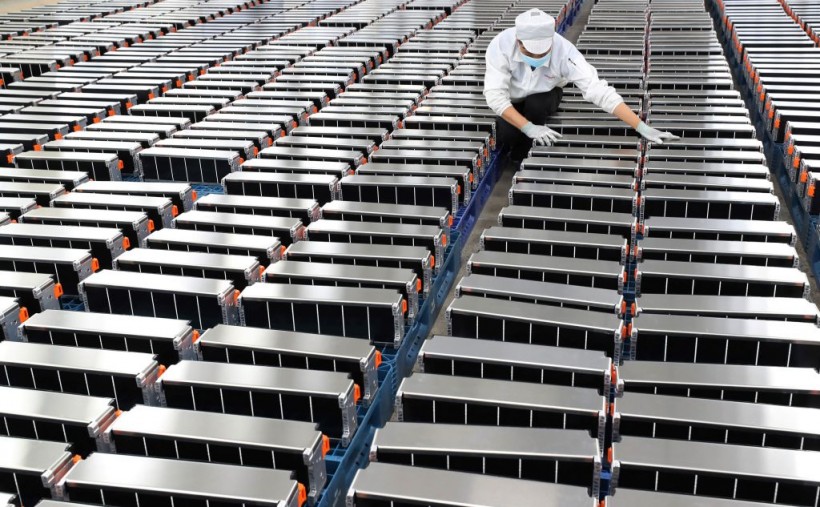India looks to attract global electronic vehicle manufacturers with new EV policies, reportedly remaining "confident" automakers will take advantage of the new policies.
As disclosed last month, the primary measures entail favorable tariffs for restricted import volumes from international electric vehicle (EV) manufacturers, contingent upon their unwavering pledge to invest a minimum of $500 million in India, according to Rajesh Kumar Singh, the country's Department of Promotion of Industry and Trade Secretary.

(Photo : Photo by STR/AFP via Getty Images) This photo taken on March 12, 2021 shows a worker with car batteries at a factory for Xinwangda Electric Vehicle Battery Co. Ltd, which makes lithium batteries for electric cars and other uses, in Nanjing in China's eastern Jiangsu province. - China OUT (Photo by AFP) / China OUT
The strict localization goals of 25% by the end of the third year and 50% by year five, intended for both domestic and international EV manufacturers, are another goal of the new EV policy. By promoting healthy competition among participants, which leads to economies of scale, higher production volumes, and lower production costs, the new regulations reportedly hope to improve the EV ecosystem.
In addition, the Ministry of Commerce & Industry stated that it will reduce the trade imbalance, decrease the import of crude oil, lessen urban air pollution, and have a good impact on the environment and human health.
Read Also: Tech Industry Sees Massive Challenges with Tesla, Google; AI Development Race Still On
India's EV Sales
India's EV sales almost doubled in 2023, according to Counterpoint Research, because to a number of factors including growing customer demand and government measures. By 2024, it is anticipated to have grown by 66% to account for 4% of all passenger vehicle sales.
Although Tesla has received a lot of attention, Singh emphasized that other international manufacturers will also be drawn to the projects, noting that VinFast, the top EV manufacturer in Vietnam, has already declared its intention to participate. Singh expresses confidence that a number of businesses will benefit from this program.
VinFast in India
In the southern Indian state of Tamil Nadu, VinFast began construction on its integrated electric vehicle manufacturing facility in February. According to the statement, the corporation intends to invest $500 million over the course of five years, with an estimated capacity of 150,000 automobiles yearly.
According to a September report, VinFast began employing people in India for back-office, sales, and legal responsibilities, among other professions. The organization stated that they are drawn to candidates who exhibit traits like the courage to act, think outside the box, and approach challenges head-on.
At this point, it's unclear how much money will be invested exactly and when the VinFast factory in Tamil Nadu would start to operate. On the other hand, VinFast presented more comprehensive plans for assembly plants in Indonesia and India in October. With an initial capital expenditure of $200 million, each of these factories is expected to be able to produce up to 50,000 automobiles annually. Production is expected to start in 2026.
Elon Musk, the CEO of Tesla, has expressed his immense excitement for India's future. He was supposed to meet Prime Minister Narendra Modi during a planned trip, but he suddenly called it off due to significant Tesla obligations.
Related Article: China-focused Xiaomi SU7 EV Secures More Than 70,000 Lock-in Orders

(Photo : Tech Times)





